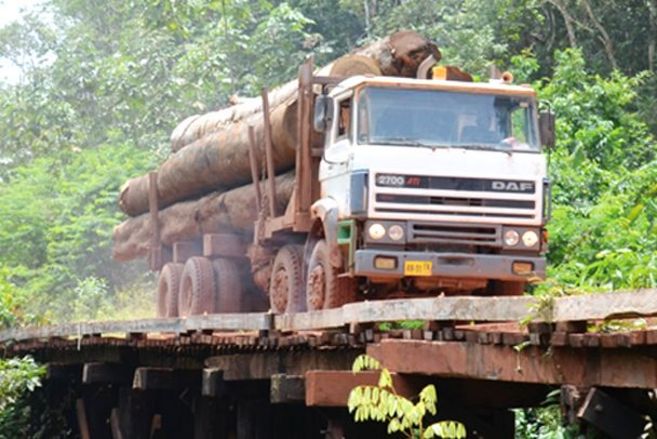Project
REDD using the example of Madagascar: a Mechanism for tropical forests
Qualitative and quantitative assessment of changes of forests in the framework of the Kyoto Protocol (Article 3.3, avoided deforestation)
Approximately 16% of the anthropogenic global greenhouse gas emissions originate from deforestation and forest degradation. Therefore, the reduction of emissions from deforestation and forest degradation (REDD) plays an important role in the international climate negotiations.
Background and Objective
On behalf of the Federal Ministry for Food, Agriculture (BMEL) we develop in cooperation with the Deutsche Gesellschaft für Internationale Zusammenarbeit (GIZ) and the HELVETAS Swiss Intercooperation operational methods for the assessment of means of forest protection. On this, a two-year pilot study was carried out in Madagascar. The cooperation partners in Madagascar are inter alia local and national forest authorities and the forest institute of the University of Antananarivo (ESSA Forêts). In this project, we elaborated an inventory methodology for the objective and periodical quantitative determination of deforestation and its resulting release of carbon from a regional to national basis. The methodology is based on the use of satellite data in combination with terrestrial inventories. Furthermore we contributed to regional based studies on the causes of deforestation in Madagascar and their potential of reduction.
The results of the project are the basis for the recommendations of the Thünen-Institute to the BMEL to the international negotiations under the Framework Convention on Climate Change (UNFCCC). These recommendations show the possibilities but also highlight the difficulties in the implementation of the REDD mechanism as an instrument of international climate negotiations.
Approach
For this we developed a basic understanding of the causes of deforestation, of the development of baselines and of inventories. In particular, the critical aspect of the accuracy of inventories (uncertainties) queries the operationality of political approaches in this regard. Countries should be rewarded if they destroy less forest. For this, changes in forest cover, degradation and biomass losses have to be accurately reported and verified. Furthermore, we worked on principles how natural forests in the tropics can be managed economically sustainable - an approach to forest conservation. The Thünen-Institute was able to elaborated bring these topics directly into the international negotiations.
Results
Results of this research project were divulged into the scientific community. A subset oft he relevant publications are listed in the following:
1. Plugge, Daniel; Baldauf, Thomas; Köhl, Michael (2013): The global climate change mitigation strategy REDD: monitoring costs and uncertainties jeopardize economic benefits. In: Climatic change, Band 119, Heft 2, Juli 2013, p. 247-259, ISSN: 0165-0009.
2. Baldauf, Thomas (2013): Monitoring Reduced Emissions from Deforestation and Forest Degradation (REDD+): Capabilities of High- Resolution Active Remote Sensing; Dissertation; Universität Hamburg, Hamburg.
3. Köhl, Michael; Baldauf, Thomas (2012): Resource Assessment Techniques for Continuous Cover Forestry. In: Timo Pukkala und Klaus von Gadow (Hg.): Continuous Cover Forestry. 2nd. Dordrecht, London: Springer Verlag; Springer (Managing Forest Ecosystems, 23), S. 273–291.
4. Plugge, Daniel; Baldauf, Thomas; Köhl, Michael (2012): The global climate change mitigation strategy REDD: monitoring costs and uncertainties jeopardize economic benefits [online]. Climatic change, ISSN: 0165-0009.
5. Kuntz, Steffen; Poncet, Felicitas von; Baldauf, Thomas; Plugge, Daniel; Kenter, Bernhard; Köhl, Michael (2011) A multi-stage inventory scheme for REDD inventories in tropical countries. In: Proceedings of 34th International Symposium for Remote Sensing of the Environment.
6. Köhl, Michael; Lister, Andrew; Scott, Charles T.; Baldauf, Thomas; Plugge, Daniel (2011) Implications of sampling design and sample size for national carbon accounting systems. Carbon balance and management, Band 6, Heft 10, Seiten 1-20, ISSN: 1750-0680.
7. Baldauf, Thomas; Plugge, Daniel; Rqibate, Aziza; Schneider, Thomas W. (2011) Ist der Tropenwald noch zu retten? : die Zerstörung der letzten Tropenwälder heizt das Klima auf. Forschungsreport Ernährung, Landwirtschaft, Verbraucherschutz, Heft 1, Seiten 4-8, ISSN: 1863-771X.
8. Plugge, Daniel; Baldauf, Thomas; Köhl, Michael (2011) Reduced emissions from deforestation and forest degradation (REDD): Why a robust and transparent monitoring, reporting and verification (MRV) system is mandatory. In: Blanco Juan, Kheradmand Houshang (Hg.). Climate change - research and technology for adaptation and mitigation, Rijeka, Croatia: InTech, Seiten 155-170.
9. Plugge, Daniel; Baldauf, Thomas; Ratsimba, Harifidy Rakoto; Rajoelison, Gabrielle; Köhl, Michael (2010) Combined biomass inventory in the scope of REDD (Reducing Emissions from Deforestation and Forest Degradation). Madagascar Conserv Dev, Band 5, Heft 1, Seiten 23-34, ISSN: 1662-2510.
10. Baldauf, Thomas; Plugge, Daniel; Rqibate, Aziza; Leischner, Bettina Charlotte; Dieter, Matthias; Köhl, Michael (2010) Development of a holistic methodology for implementing a REDD-Scheme at the example of Madagascar. Hamburg: vTI, Work report of the Institute for World Forestry 2010/02.
11. Baldauf, Thomas; Plugge, Daniel; Rqibate, Aziza; Köhl, Michael (2009) Case studies on measuring and assessing forest degradation: monitoring degradation in the scope of REDD. Rome: FAO, Forest Resources Assessment Working Paper 162.
12. Köhl, Michael; Baldauf, Thomas; Plugge, Daniel; Krug, Joachim (2009) Reduced emissions from deforestation and forest degradation (REDD): a climate change mitigation strategy on a critical track. Carbon balance and management, Band 4, Seite 10 pp, ISSN: 1750-0680.
13. Köhl, Michael; Baldauf, Thomas; Plugge, Daniel (2007) Einsatz von Fernerkundung zur Erfassung der Entwaldung : Pilotstudie Madagaskar: Vermiedene Entwaldung als Klimaschutzoption. AFZ, der Wald, Band 62, Heft 23, Seite 1262-1263, ISSN: 0936-1294; 1430-2713.
The project was jointly organized by the University of Hamburg and the former Thünen Institute for World Forestry (Head: Prof. Dr. Michael Köhl).
Thünen-Contact

Involved external Thünen-Partners
-
Universität Hamburg
(Hamburg, Deutschland)
Duration
7.2007 - 9.2013
More Information
Project status:
finished
List of Publications
- 0
Baldauf T (2013) Monitoring reduced emissions from deforestation and forest degradation (REDD+) : capabilities of high-resolution active remote sensing . Hamburg: Universität, 152 p, Hamburg, Univ, Diss
- 1
Plugge D, Baldauf T, Köhl M (2012) The global climate change mitigation strategy REDD :monitoring costs and uncertainties jeopardize economic benefits. Clim Change 119:247-259, doi:10.1007/s10584-012-0524-3
- 2
Plugge D, Baldauf T, Köhl M (2011) Reduced emissions from deforestation and forest degradation (REDD): Why a robust and transparent monitoring, reporting and verification (MRV) system is mandatory [online]. In: Blanco J, Kheradmand H (eds) Climate change - research and technology for adaptation and mitigation, Rijeka, Croatia. London: InTech, pp 155-170, zu finden in <http://www.intechopen.com/download/pdf/pdfs_id/18718> [zitiert am 12.09.2011]
- 3
Plugge D, Baldauf T, Ratsimba HR, Rajoelison G, Köhl M (2010) Combined biomass inventory in the scope of REDD (Reducing Emissions from Deforestation and Forest Degradation) [online]. Madagascar Conserv Dev 5(1):23-34, zu finden in <http://journalmcd.com/index.php/mcd/article/view/168/129> [zitiert am 24.06.2010]
- 4
Baldauf T, Plugge D, Rqibate A, Leischner B, Dieter M, Köhl M (2010) Development of a holistic methodology for implementing a REDD-Scheme at the example of Madagascar. Hamburg: vTI, 108 p, Arbeitsber Inst Weltforstwirtsch Work Rep 2010/02
- 5
Baldauf T, Plugge D, Rqibate A, Köhl M (2009) Case studies on measuring and assessing forest degradation : monitoring degradation in the scope of REDD. Rome: FAO, 13 p, Forest Res Assessment Working Paper 162
- 6
Köhl M, Baldauf T, Plugge D, Krug J (2009) Reduced emissions from deforestation and forest degradation (REDD): a climate change mitigation strategy on a critical track. Carbon Balance Manag 4:10, DOI:10.1186/1750-0680-4-10







